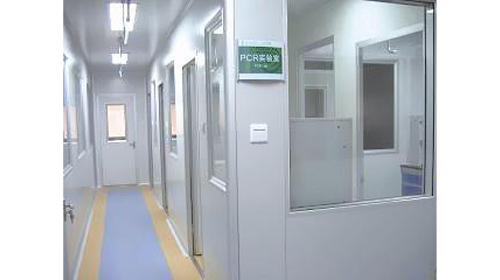About PCR Laboratory:
PCR laboratory is also called gene amplification laboratory. PCR is the Polymerase Chain Reaction (Polymerase Chain Reaction). Molecular biology is a technique used to amplify a specific piece of DNA, which can be seen as a specific DNA copy in an organism outside the body. Through DNA genetic tracking system, can quickly grasp the concentrations of the virus in the body, patients with the precision up to nanometer level, the number of accurate detection of hepatitis b virus in the patient's body, whether copying, whether infections, infectious how strong, if necessary, abnormal changes of liver function for timely diagnose patients is most suited to use which kinds of antiviral drugs, judging curative effect how, to clinical therapy provides reliable testing basis
Condition:
1. Must have a standard PCR fluorescence laboratory; Real-time fluorescent quantitative PCR technology was introduced by American Applied Biosystems in 1996, because this technology not only realized the leap from qualitative PCR to quantitative PCR, but also compared with conventional PCR, it has stronger specificity, effectively solve the problem of contamination of PCR, high degree of automation, and has been widely used. In this paper, the quantitative principle, method and some reference problems are introduced.
2. Testing equipment must meet the setting requirements of standard PCR fluorescence laboratory; Fluorescence quantitative PCR instrument, real-time fluorescence quantitative reagents, general computer and automatic analysis software constituted PCR-DNA/RNA real-time fluorescence quantitative detection system.
3. Must pass the acceptance and certification of the National Clinical Laboratory Center;
4. The testing personnel must pass the business training of the National Temporary Inspection Center and obtain the qualification certificate; PCR laboratory staff must attend clinical gene amplification training courses organized by the Ministry of Health or provincial clinical laboratory centers, and hold a certificate to work. PCR laboratory through the acceptance, at least two laboratories must hold the "clinical gene testing license". PCR laboratories must establish strict laboratory management system, standardized operating procedures (SOP), and a series of quality management documents to ensure that the daily operation of the laboratory meets the requirements of the Ministry of Health, the accuracy of test results, the health and safety of the laboratory, and the long-term stable operation of the laboratory.
5. It must be operated in a sterile and dust-free environment.
Function:
Patients can be scientific, accurate, real-time control, and combined with anti HBV and T cell immune to break the immune tolerance, blocking therapy liver virus replication and effective decomposition of hepatitis virus, solved the hepatitis b virus variation, resistant, difficult to treat viral replication template, state of the body's immune tolerance is not easy to break and other medical problems, can rapidly eliminate the symptoms, and effectively suppress HBV replication, significantly increase the serum conversion rate of e antigen, antibody, pathogens in the blood and liver cells, to prevent reinfection provides long-term protection, effectively blocking and reverse process of liver fibrosis and cirrhosis of the liver.







